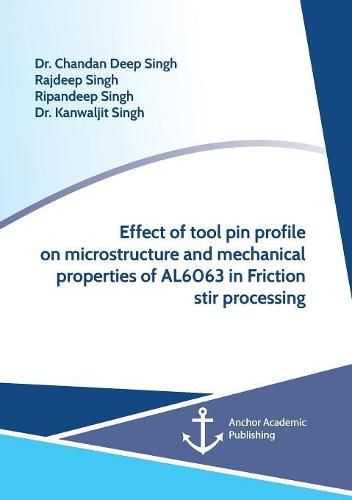Readings Newsletter
Become a Readings Member to make your shopping experience even easier.
Sign in or sign up for free!
You’re not far away from qualifying for FREE standard shipping within Australia
You’ve qualified for FREE standard shipping within Australia
The cart is loading…






This title is printed to order. This book may have been self-published. If so, we cannot guarantee the quality of the content. In the main most books will have gone through the editing process however some may not. We therefore suggest that you be aware of this before ordering this book. If in doubt check either the author or publisher’s details as we are unable to accept any returns unless they are faulty. Please contact us if you have any questions.
Friction stir processing (FSP) is a solid state process in which a non consumable stirring (rotating) tool is plunged into a work piece up to half thickness, which causes intense plastic deformation, material mixing, and thermal exposure, resulting in refinement of micro structural properties, enhancement of mechanical properties, and homogeneity of the processed (nugget) zone. The FSP technique has been successfully used for producing fine-grained structure and surface composite, modifying the microstructure of materials, synthesizing composites like metal-metal composites. The use of FSP generates significant frictional heating and intense plastic deformation, thereby resulting in the occurrence of dynamic recrystallization in the stirred zone (SZ). Although there is still a controversy about the grain-refinement mechanism in the SZ, it is generally believed that the grain refinement is due to dynamic recrystallization. Therefore, the factors influencing the nucleation and growth of the dynamic recrystallization will determine the resultant grain microstructure in the SZ. It has been demonstrated that the FSP parameters, tool geometry, material chemistry, workpiece temperature, vertical pressure, and active cooling exert a significant effect on the size of the recrystallized grains in the SZ.
$9.00 standard shipping within Australia
FREE standard shipping within Australia for orders over $100.00
Express & International shipping calculated at checkout
This title is printed to order. This book may have been self-published. If so, we cannot guarantee the quality of the content. In the main most books will have gone through the editing process however some may not. We therefore suggest that you be aware of this before ordering this book. If in doubt check either the author or publisher’s details as we are unable to accept any returns unless they are faulty. Please contact us if you have any questions.
Friction stir processing (FSP) is a solid state process in which a non consumable stirring (rotating) tool is plunged into a work piece up to half thickness, which causes intense plastic deformation, material mixing, and thermal exposure, resulting in refinement of micro structural properties, enhancement of mechanical properties, and homogeneity of the processed (nugget) zone. The FSP technique has been successfully used for producing fine-grained structure and surface composite, modifying the microstructure of materials, synthesizing composites like metal-metal composites. The use of FSP generates significant frictional heating and intense plastic deformation, thereby resulting in the occurrence of dynamic recrystallization in the stirred zone (SZ). Although there is still a controversy about the grain-refinement mechanism in the SZ, it is generally believed that the grain refinement is due to dynamic recrystallization. Therefore, the factors influencing the nucleation and growth of the dynamic recrystallization will determine the resultant grain microstructure in the SZ. It has been demonstrated that the FSP parameters, tool geometry, material chemistry, workpiece temperature, vertical pressure, and active cooling exert a significant effect on the size of the recrystallized grains in the SZ.